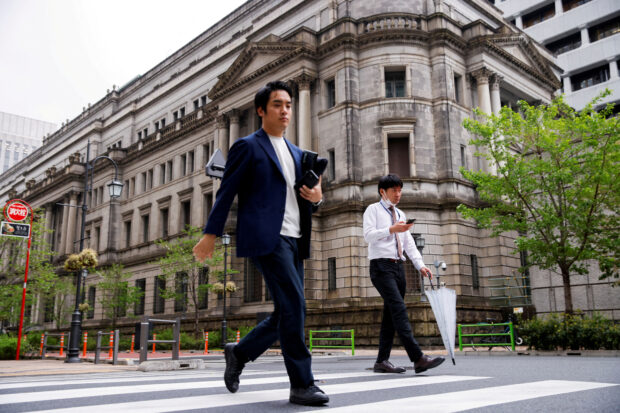
People walk in front of the bank of Japan building in Tokyo, Japan, April 7, 2023. REUTERS/Androniki Christodoulou/File photo
The Bank of Japan’s policy decision – and perhaps more importantly, Governor Kazuo Ueda’s press conference – is the main focus for Asian markets on Tuesday, as the deepening slump in Chinese and Hong Kong markets continues to unnerve investors.
While sentiment toward China’s economy and markets is clearly deteriorating, the spillover to the rest of Asia may be contained to a certain extent by the more upbeat mood globally.
The S&P 500 on Monday hit a fresh record high for a second consecutive day while Japan’s Nikkei 225 registered another 34-year peak. This helped limit the downside in Asia on Monday, and the MSCI Asia ex-Japan index slipped 0.6 percent.
READ: Wall Street smashes records ahead of heavy corporate earnings
The BOJ is not expected to alter policy, so the statement and Ueda’s guidance will be intensely scrutinized for signals of when and how the ‘normalization’ process and eventual move away from negative interest rates will unfold this year.
Or if.
Recent inflation data has been soft, taking pressure off the BOJ to act. With inflation seemingly gliding back toward the BOJ’s 2 percent target, traders are adjusting their rate expectations and Japanese assets are reacting accordingly.
READ: Japan leads Asia stocks higher, central banks loom
Stocks are up almost 10 percent this month, the yen is sliding back toward the 150.00 per dollar area, and bond yields are significantly lower than they were a few months ago, despite being dragged higher in recent days by the rise in global yields.
Investors’ outlook on China, Japan
The difference between investors’ outlook towards Japan and China is night and day. Both may be over-cooked right now, but market momentum in both countries is strong and showing little sign of reversing.
China and Hong Kong shares slumped again on Monday. China’s bluechip CSI300 Index skidded 1.6 percent to its lowest closing level in five years, the Shanghai Composite Index sank 2.7 percent – its biggest fall since April 2022 – and in Hong Kong the Hang Seng Index fell 2.3 percent to its lowest level in 14 months.
READ: Asian shares mixed, Hong Kong stocks near 15-month low
China’s central bank stood pat on interest rates on Monday, as expected. But many traders and investors will be wondering how much longer policymakers can sit on their hands. The longer it does, the longer the stock market selloff might go on.
Beijing has said it will take more forceful and effective measures to support market confidence, state media CCTV reported on Monday, citing a cabinet meeting chaired by Premier Li Qiang.
Also on Monday, China’s major state-owned banks moved to support the yuan, tightening liquidity in the offshore foreign exchange market while actively selling U.S. dollars onshore as equities slid, sources told Reuters.